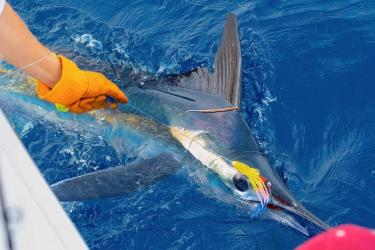The Woods Hole Oceanographic Institution announces a new scientific review paper on assessing North Atlantic right whale health with several NOAA Fisheries co-authors. The manuscript was published in the science journal Diseases of Aquatic Organisms. It reviews North Atlantic right whale health assessment techniques, how those tools have been useful in identifying and prioritizing the threats these whales face, and how to better monitor the health status of these whales. The goal of this work is to be better able to understand and enhance the welfare of individuals, and to reverse the current decline of this endangered species.
North Atlantic right whales are protected under the Endangered Species Act and the Marine Mammal Protection Act. Scientists estimate there may be fewer than 400 remaining, making them one of the rarest marine mammals in the world. The species has been experiencing an “Unusual Mortality Event” since 2017, which is ongoing. Climate change, vessel strikes, entanglements, and ocean noise can contribute to poor health and reproductive failure. They are threats to individuals and the species as a whole.
A review was recently published about North Atlantic right whale health assessment techniques, what those tools have taught us of the threats these whales face, and how to better monitor their status. Photographs of individual whales from planes and vessels allow us to recognize, track and measure individuals through their lives. Samples from live and dead animals allow better understanding of their health, disease, and the major causes of lethal and sub-lethal trauma. They include human-caused activities such as entanglement in fishing gear and vessel collisions. Trauma from fishing gear entanglement and vessel collision, along with climate-induced changes in food availability, have led to serious health problems for the whales. They are impeding the species’ ability to recover.
Modeling is critical to our understanding of the status and trends of North Atlantic right whale health. In particular, they help us understand the interactions of multiple stressors on both individuals and the species as a whole. The nature of routine sighting and health assessment opportunities is fragmented and changing. Models are critical to translate available data into best estimates of North Atlantic right whale health status and trends. Therefore, trauma reduction measures, and applying new tools to assess and enhance whale health, are critically important.
“Conserving and recovering the endangered North Atlantic Right Whale is a research priority,” said co-author Teri Rowles, NOAA Fisheries Senior Advisor for Marine Mammal Health Science. “In addition to the threats posed by humans, changing ocean conditions have profound impacts on where whales travel and how they behave. For these reasons, NOAA Fisheries was pleased to have hosted and sponsored this important workshop among partners to discuss how science can aid management.”


